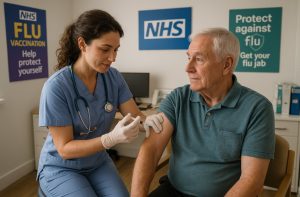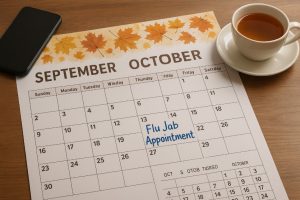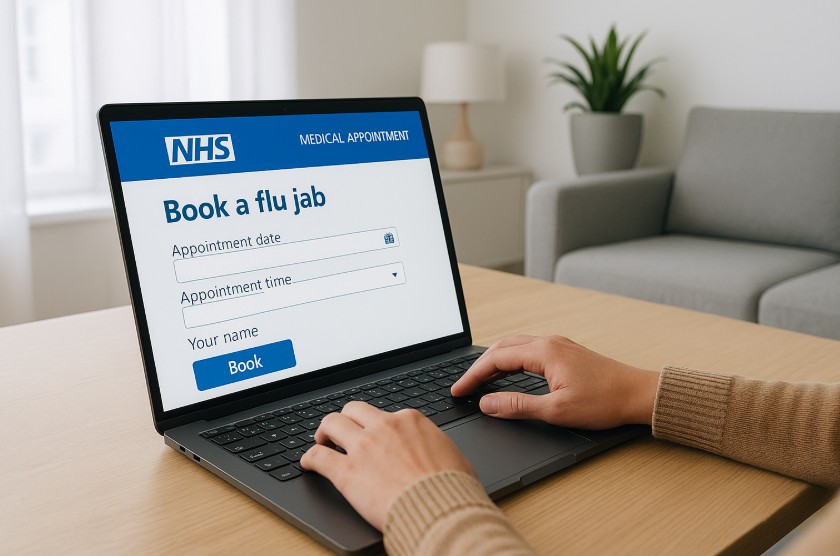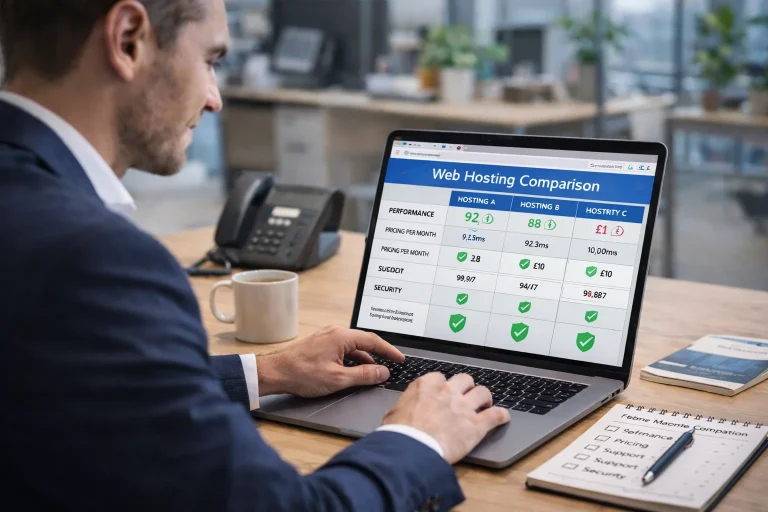Booking your NHS flu jab has never been easier, thanks to improved digital services and nationwide pharmacy access.
With seasonal influenza posing serious health risks, especially to vulnerable groups, timely vaccination is essential. This guide explains how to book, change or cancel your flu jab appointment online, through your GP, or at a local pharmacy.
Whether you’re eligible for a free NHS jab or looking for private options, this article covers everything you need to know for a smooth vaccination experience.
What Is the NHS Flu Jab and Why Is It Important?

The NHS flu jab is an annual vaccination offered to protect individuals against the influenza virus.
Influenza, more commonly known as the flu, can lead to serious complications, particularly for vulnerable groups such as the elderly, pregnant women, young children, and those with pre-existing health conditions.
The vaccination plays a crucial role in reducing the severity of flu symptoms, lowering transmission rates, and protecting the healthcare system from being overwhelmed during the winter months.
Every year, the flu vaccine is updated to include the most recent strains predicted to be in circulation.
Although not every strain can be anticipated, the jab significantly reduces the risk of catching or becoming severely unwell from the flu.
Who Is Eligible for a Free NHS Flu Jab?
The flu jab is provided free of charge on the NHS to people who are more likely to suffer severe effects from flu. These include:
- People aged 65 or over (including those turning 65 by 31 March 2026)
- Individuals with long-term health conditions such as diabetes, asthma, or heart disease
- Pregnant women
- Residents of care homes
- Carers, or those who receive carer’s allowance
- People who live with someone with a weakened immune system
- Frontline health and social care workers (via employer)
Children are also eligible in many cases, although their vaccination is usually administered via a nasal spray at school or at a GP surgery.
How Can You Book a Flu Jab Online Through the NHS?
The NHS has streamlined the process of booking a flu vaccination to ensure easy access for eligible individuals.
If you’re over 18 and eligible for a free NHS flu jab, the simplest way to secure an appointment is by using the official NHS online service or NHS App.
The process includes:
- Verifying eligibility through the NHS online portal
- Selecting a nearby pharmacy participating in the flu vaccination programme
- Choosing an available date and time for the appointment
- Receiving a booking reference for future updates or cancellations
You can also contact your GP surgery directly or call 119 for support with booking, particularly if you do not have access to the internet or require translation services.
In some cases, you may be offered a COVID-19 vaccination alongside your flu jab, depending on your eligibility and availability.
When Is the Best Time to Book Your NHS Flu Jab?

Timing is essential when it comes to flu vaccinations. The best time to book and receive the flu jab is in the early autumn months, typically from late September to early November.
This allows enough time for the vaccine to become effective, which usually takes up to 14 days after administration.
Booking early also means:
- A wider choice of available appointment slots
- Greater protection ahead of the flu season peak
- Reduced risk of missing out due to vaccine supply issues
Online bookings for the 2025/2026 flu season are expected to remain open until 30 March 2026, but the sooner you are vaccinated, the more protection you will have during the winter.
Can You Get the NHS Flu Jab at Pharmacies or Walk-In Clinics?
Many community pharmacies now offer NHS flu vaccinations, making access easier for individuals who may not be able to visit their GP. Pharmacies often provide the option to book online or simply walk in, depending on availability.
Options include:
- Booking directly via the NHS flu jab booking system
- Using pharmacy websites to schedule a convenient time
- Visiting a local pharmacy without an appointment (walk-in service)
Some pharmacies offer extended hours, including evenings and weekends, which adds flexibility for those with busy schedules. The NHS also supports those with hearing or communication difficulties by offering textphone (18001) and British Sign Language interpreter services.
Who Is Recommended to Have the Flu Vaccine?
The NHS flu vaccine is primarily recommended for individuals who are at higher risk of becoming seriously ill from influenza. These people are more likely to experience complications such as pneumonia or require hospitalisation if they contract the virus.
The following groups are eligible for the free NHS flu jab:
- Adults aged 65 or over (including those turning 65 by 31 March 2026)
- People with specific long-term health conditions such as asthma, diabetes, or heart disease
- Pregnant women
- Residents of care homes
- Carers and those receiving a carer’s allowance
- People who live with someone who has a weakened immune system
- Frontline health and social care workers (eligible through their employer)
Children and young people may also be eligible for the flu vaccine, usually administered as a nasal spray through school programmes or at GP surgeries.
Are There People Who Should Avoid the Flu Vaccine?

While the vast majority of eligible people can safely receive the flu vaccine, there are a few exceptions. The vaccine should not be given to individuals who have experienced a serious allergic reaction (anaphylaxis) to a previous dose or one of its ingredients.
Additional considerations include:
- Some flu vaccines used in the UK contain egg protein. People with egg allergies should inform the healthcare professional before vaccination so an appropriate alternative can be offered.
- If a person has a high temperature or is feeling acutely unwell, it is advisable to wait until they recover before receiving the jab.
These measures ensure that the vaccine is administered safely and effectively to those who need it most.
What Should You Know About Flu Vaccine Safety and Effectiveness?
The NHS only uses vaccines that are thoroughly tested and approved by the Medicines and Healthcare products Regulatory Agency (MHRA). Flu vaccines used in the UK are inactivated, meaning they do not contain live viruses and cannot cause flu.
There are several types of flu vaccines available, tailored to different age groups and health conditions:
| Age Group | Recommended Vaccine Type |
| 65 and over | Adjuvanted quadrivalent (aQIV) |
| 60 to 64 | Standard quadrivalent or cell-based vaccine |
| 50 to 59 | Cell-based or recombinant vaccine |
| 18 to 49 | Quadrivalent influenza vaccine |
| Children (2 to 17) | Live attenuated influenza vaccine (nasal spray) |
Mild side effects are common and may include:
- Soreness at the injection site
- A slightly raised temperature
- General muscle aches
These typically resolve within one to two days. Severe allergic reactions are extremely rare and medical staff are trained to manage them immediately.
The vaccine takes around 14 days to become effective. While it’s still possible to catch the flu after vaccination, symptoms are generally milder and shorter in duration. Because flu strains change every year and immunity declines over time, annual vaccination is strongly advised.
What If You’re Not Eligible for a Free NHS Flu Jab?
If you are not eligible for a free NHS flu vaccination, you still have the option to get vaccinated by paying privately.
Many pharmacies and health clinics offer private flu jabs for a small fee. This is especially important for those who work in high-contact environments or live with someone vulnerable but do not meet NHS criteria.
Typical details for private flu vaccinations:
- Cost: Around £15 to £20
- Providers: Boots, LloydsPharmacy, Superdrug, and local clinics
- Availability: Online booking or in-person visits
This option ensures everyone has access to protection, even outside the NHS criteria.
What Happens During Your Flu Vaccination Appointment?

A flu vaccination appointment is quick and straightforward. Most appointments take around 10 to 15 minutes, and the procedure is similar whether it takes place at a GP surgery or pharmacy.
Here is what generally happens:
- Identity and eligibility are confirmed at check-in
- A short health questionnaire is completed to rule out contraindications
- The vaccine is administered via injection in the upper arm
- Post-vaccination guidance is provided, including information on side effects
Side effects are typically mild and short-lived. These may include slight discomfort at the injection site, a low-grade fever, or muscle aches. Most symptoms resolve within 24 to 48 hours.
How Does the NHS Online Flu Jab Booking System Work?
The NHS online system allows for streamlined booking, updating, and cancelling of appointments. The process is designed to be inclusive, offering multiple access points and support services.
You can use the system to:
- Check if you are eligible for a flu vaccine
- Book an appointment at a local pharmacy
- View, change, or cancel an existing appointment using your reference number
- Access services in different languages or request interpretation
- Use accessibility services for individuals with communication difficulties
If you prefer not to use the online system, the 119 telephone line is available to help book appointments over the phone. Interpreters are also available through this service for non-English speakers.
How Does the NHS Ensure Vaccine Safety and Effectiveness?

The flu vaccines used in the UK are carefully regulated and approved by the Medicines and Healthcare products Regulatory Agency (MHRA). These vaccines are updated annually based on global surveillance data to target the most likely strains of influenza for the coming season.
Key points on vaccine safety:
- Most vaccines are inactivated and cannot give you flu
- Side effects are usually mild and temporary
- Allergic reactions are extremely rare and treated immediately if they occur
There are different vaccine types depending on age group and health status. Some flu vaccines contain egg protein, so individuals with egg allergies should inform their vaccination provider in advance.
Vaccination is safe to have alongside other vaccines such as COVID-19 or shingles, though it’s not generally given with the RSV vaccine unless medically necessary.
Conclusion
Securing your NHS flu jab booking early not only ensures protection against seasonal influenza but also helps reduce pressure on the NHS during peak winter months.
Whether booking online, through your GP, or visiting a local pharmacy, the process is simple and accessible. Early vaccination remains the best defence for yourself, your loved ones, and your community.
Don’t wait for flu season to reach its peak. Check your eligibility and book your appointment today.
FAQs
Can you get a flu jab without an NHS number?
Most people will need an NHS number to book online, but walk-in services or GP surgeries may still accommodate you. Call 119 for advice.
How do I change my flu jab appointment online?
You’ll need your booking reference number. Visit the NHS booking website and select the option to amend your appointment.
What should I do if I miss my flu jab appointment?
You can rebook online or call 119 to find the next available appointment. There is no penalty for missing, but timely vaccination is advised.
Is it safe to get the flu jab while pregnant?
Yes. The NHS strongly recommends flu vaccination during pregnancy to protect both mother and baby.
Can children get the NHS flu jab at school?
Yes. Eligible school-aged children may receive the flu vaccine (usually the nasal spray version) at school. Parents will be notified in advance.
Are there any side effects after the flu jab?
Most side effects are mild, such as a sore arm or slight fever. These typically resolve within 48 hours.
How often should I get the flu vaccine?
The flu vaccine should be taken every year as the virus strains change annually and immunity can fade over time.








